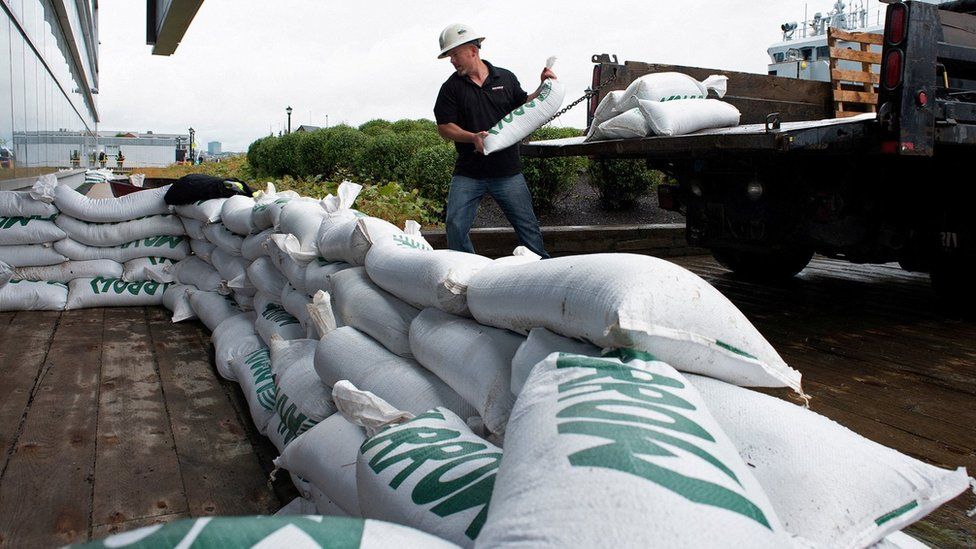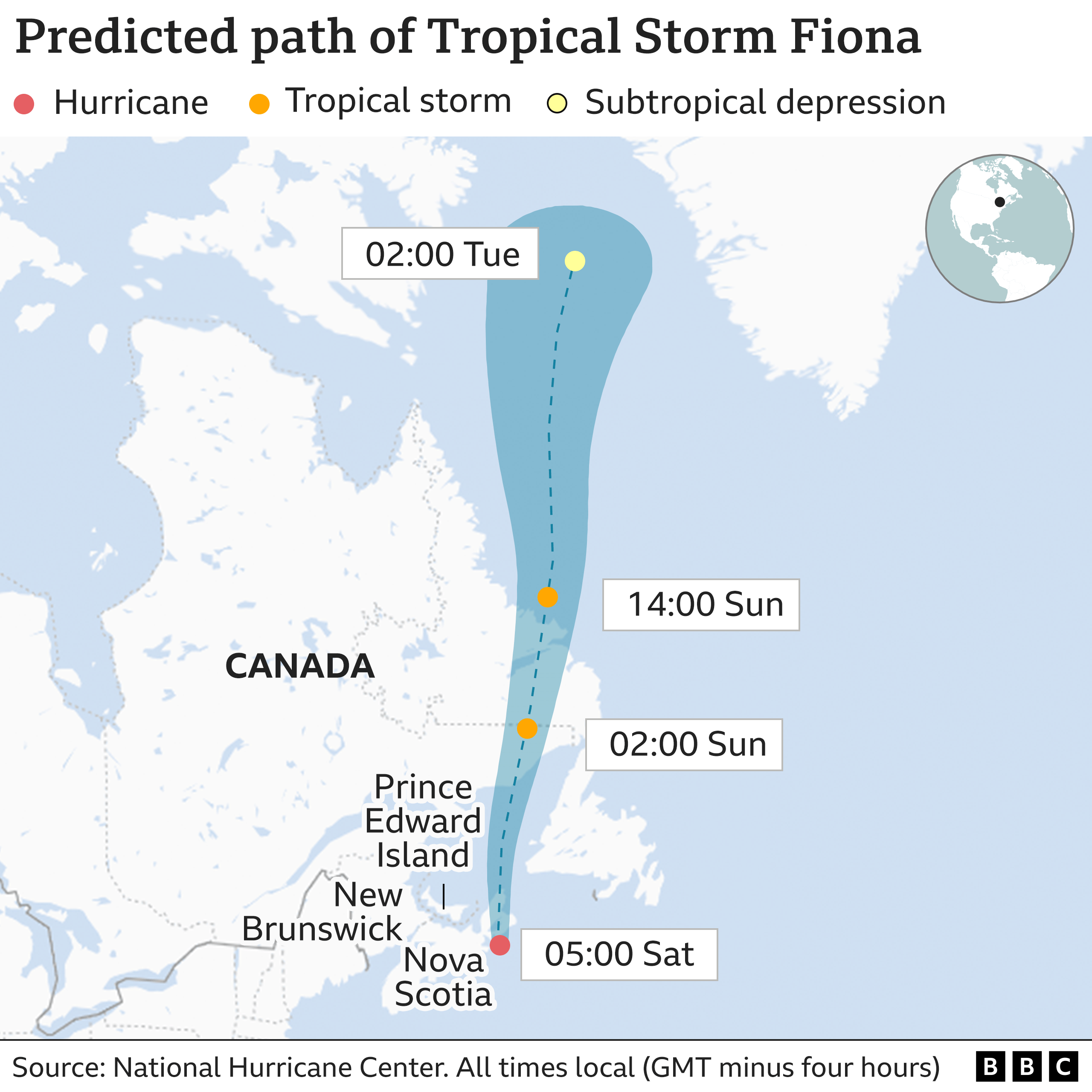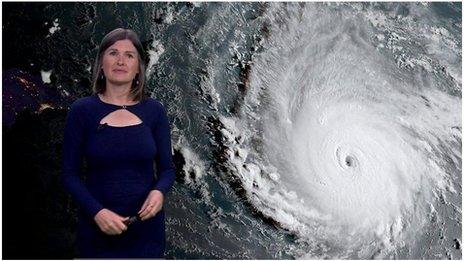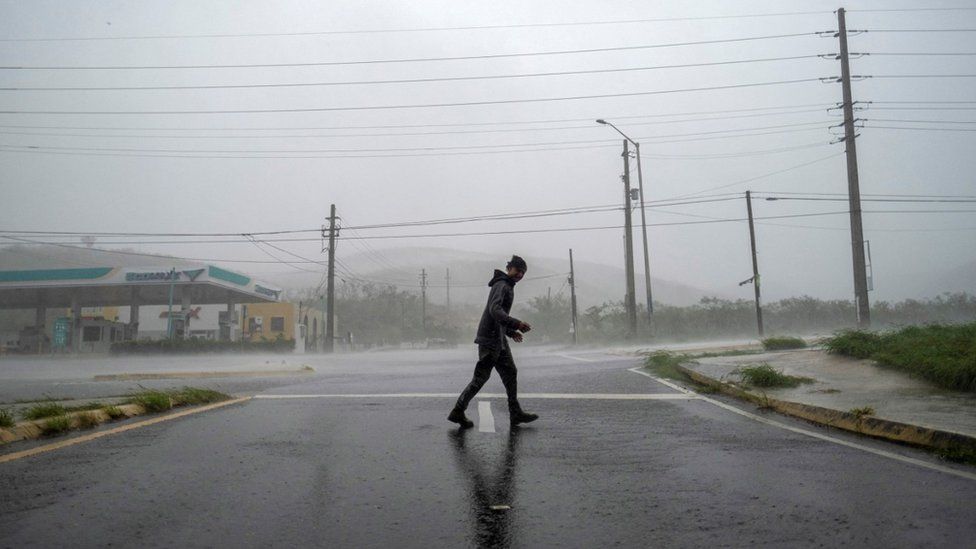Hurricane Fiona: Canada hit by 'historic, extreme event'
Watch: Storm Fiona hits Canada's Atlantic coastline
Hundreds of thousands of people have been left without power, after Storm Fiona hit Canada's coastline.
Fiona was downgraded from a hurricane to a tropical storm on Friday.
But parts of Nova Scotia, Prince Edward Island and New Brunswick still experienced torrential rain and winds of up to 160km/h (99mph), with trees and powerlines knocked down.
Prime Minister Justin Trudeau said the situation was critical, and promised to provide support through the army.
Officials have yet to share reports of fatalities or serious injuries, but authorities are dealing with extensive flooding.
In a briefing Mr Trudeau described Fiona as "a very powerful and dangerous storm" and said the army will be deployed to help with assessment and clean-up efforts. His government has already responded positively to a request by Nova Scotia authorities for assistance.
"If there is anything the federal government can do to help, we will be there," he said, adding that he would no longer travel to Japan to attend the funeral of former Prime Minister Shinzo Abe.
Tropical storm warnings were issued for the Atlantic provinces of Nova Scotia, Prince Edward Island, Newfoundland and New Brunswick, as well as in parts of Quebec.
The country's eastern region could receive up to 10in (25cm) of rain, increasing the risk of flash flooding.
 REUTERS
REUTERSIn Nova Scotia, shelters were prepared in Halifax and Cape Breton for people to take cover ahead of the storm.
"We have been through these types of events before, but my fear is, not to this extent," said Amanda McDougall, mayor of Cape Breton Regional Municipality. "The impacts are going to be large, real and immediate."
In Port aux Basques, with a population of 4,067 on the southwest tip of Newfoundland, intense flooding saw some homes and office buildings washed out to sea, local journalist Rene Roy, told CBC. The area is under a state of emergency.
"This is hands down the most terrifying thing I've ever seen in my life," Mr Roy said.
He added that many homes were left as "a pile of rubble in the ocean right now", adding: "There is an apartment building that's literally gone. There are entire streets that are gone."
Officials later confirmed that at least 20 homes had been lost.
And the Royal Canadian Mounted Police said a woman was rescued after being "tossed into the water as her home collapsed" in the area. They said another report of a women being swept out from her basement had been received, but conditions remained too dangerous to conduct a search.
Power companies have warned that it could take days to restore electricity, as wind speeds remain too high to start work on downed power lines.
Severe hurricanes in Canada are rare, as storms lose their energy once they hit colder waters in the north and become post-tropical instead. But pressure in the region is predicted to be historically low as Storm Fiona hits, making way for a heavier storm.
Nova Scotia was last battered by a tropical cyclone in 2003 with Hurricane Juan, a category two storm that killed two people and heavily damaged structures and vegetation.
Meteorologist Bob Robichaud warned on Friday afternoon that Fiona will be bigger than Juan, and stronger than 2019's Hurricane Dorian, which also reached the shores of Nova Scotia.

Fiona had already wreaked havoc on Puerto Rico and the Dominican Republic earlier this week, with many still left without power or running water.
Florida also faces a hurricane threat as tropical storm Ian strengthened as it moved over the Caribbean on Saturday. It could approach Florida early next week as a major hurricane.
Ian's projected path takes it just south of Jamaica, over western Cuba and into Florida, the hurricane centre said.
Florida Keys and South Florida could be hit by heavy rains on Monday, according to forecasters.
Florida Governor Ron DeSantis declared a state of emergency on Friday, freeing up funding and emergency services in advance of the storm.
Storm Fiona hits eastern Canada, leaving 'total devastation'
Powerful storm Fiona lashed into eastern Canada on Saturday, cutting power to thousands and washing houses into the sea as it pummeled the area with fierce winds and rains "like nothing we've ever seen," police said.
Storm Fiona hits eastern Canada, leaving 'total devastation'
Two women were swept into the ocean in Newfoundland, the Royal Canadian Mounted Police reported. One was rescued, but the other is still missing.
Mayor Brian Button of Channel-Port aux Basques, at the southwestern tip of Newfoundland, told CBC News that the scene there was one of "total devastation," adding, "this has become bigger, and worse, than we had imagined."
Rene Roy, a newspaper editor in Channel-Port aux Basques, said, "These are the strongest winds anyone in the community has ever seen. Several houses have been washed into the sea."
As of midday, some 500,000 homes were left without power across the region as the storm pummeled a wide area, felling countless trees and ripping roofs from buildings.
"The power lines are down everywhere," Erica Fleck, assistant chief of Halifax Regional Fire and Emergency, told CBC. "It's not safe to be on the roads."
Although downgraded to a post-tropical cyclone, Fiona still packed hurricane-force winds of 80 miles (130 kilometers) per hour as it barreled into Canada after earlier battering the Caribbean, according to meteorologists.
Nova Scotia hard hit
The storm first made landfall in Nova Scotia province around 3:00 am (0600 GMT), according to the Canadian Hurricane Center (CHC).
In Nova Scotia, 384,000 households were without electricity by midday Saturday, Nova Scotia Power reported, while New Brunswick reported 32,000 and Prince Edward Island some 82,000.
"Trees have come down on homes, trees have come down on cars, there's buildings that have collapsed," Fire Chief Lloyd MacIntosh in the Nova Scotia town of North Sydney told CBC.
Police in Charlottetown, the capital of Prince Edward Island, posted images of tangles of downed power lines and roofs punctured by felled trees.
"It's incredible," said Charlottetown mayor Philip Brown on Radio-Canada TV. "It's stronger than Hurricane Juan in 2003."
Nova Scotia Premier Tim Houston said in a statement that "it will take time for Nova Scotia to recover. I just ask everyone for their patience."
Canadian Prime Minister Justin Trudeau tweeted: "I want you to know that we're here for you... Our government stands ready to support the provinces with additional resources."
Canada had issued severe weather warnings for swaths of its eastern coast, advising people to lay in supplies for at least 72 hours.
Rainfall of up to 4.9 inches (125 millimeters) was recorded in Nova Scotia and Prince Edward Island, the CHC said, with waves of up to 40 feet (12 meters) hitting Nova Scotia and western Newfoundland.
The CHC said conditions would improve in western Nova Scotia and eastern New Brunswick later Saturday and over southwestern Newfoundland and Iles-de-la-Madeleine late Saturday night.
Puerto Rico struggling
Fiona had skirted Bermuda a day earlier, with residents battening down and authorities calling for people to remain inside as strong winds raked over the British territory. No fatalities or major damage were reported as the storm passed roughly 100 miles to the west of the island.
Bermuda, whose economy is fueled by international finance and tourism, is wealthy compared with most Caribbean countries, and structures must be built to strict planning codes to withstand storms. Some have done so for centuries.
Fiona killed at least four people in Puerto Rico earlier this week, according to US media, while two deaths were reported in the Dominican Republic and one in the French overseas department of Guadeloupe.
President Joe Biden declared a state of emergency in Puerto Rico, a US territory that is still struggling to recover from Hurricane Maria five years ago.
In the Dominican Republic, President Luis Abinader declared three eastern provinces to be disaster zones.
As the Caribbean licked its wounds from Fiona, Cuba, Jamaica and Florida were bracing Saturday for the arrival of tropical storm Ian, which is expected to gain power in coming days to reach "at or near major hurricane strength," the NHC said.
In anticipation of the storm, NASA called off the scheduled Tuesday launch of its historic uncrewed mission to the Moon.
(AFP)




No comments:
Post a Comment